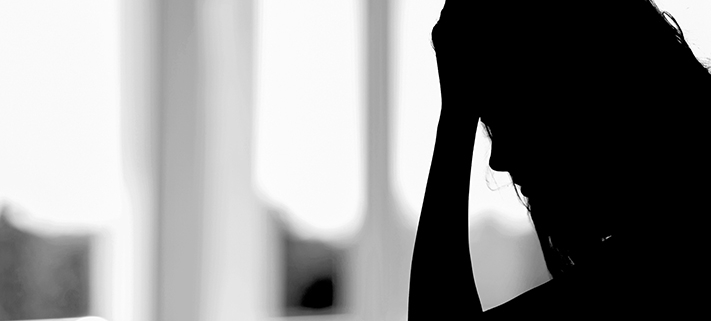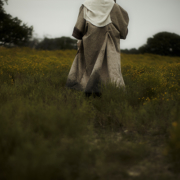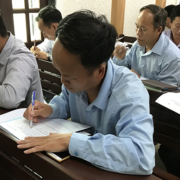Light in the darkness of doubt
A woman’s trust in God’s plan for her is challenged by a difficult-to-diagnose disease.
Darla Nagel
I had no hope, no idea what to do now. Why are you letting this happen to me, God?
I sat on my bed in my college-town apartment and let the tears loose. Holding them in seemed like a poor way to spend the energy I had left.
I’d just received a brief phone call from my dad. He passed along the results of a sleep study I’d had at the University of Michigan hospital. The sleep technicians had initially had a difficult time assessing my breathing with their equipment. My hopes soared; maybe sleep apnea was the cause of a host of debilitating symptoms I’d developed two years earlier, at age 19. I have been experiencing crushing and gradually worsening physical and cognitive exhaustion. It threatened my pursuit of a degree in English and of a career in publishing, possibly even Christian publishing.
The news was not good: the sleep study results had been negative. They could not find the cause.
The darkness
I can’t take this. How is this going to be good for me? I was thinking of a usually comforting Bible verse framed in my bedroom at home: “For I know the plans I have for you . . . plans to give you hope and a future” (Jeremiah 29:11). I felt my frustration with the lack of a diagnosis. It began transforming into anger at God. I knew I’d regret that anger later, so I tried a different tack.
I grabbed the box of tissues out of the bathroom, blew my nose, and grabbed my journal to vent by writing all the questions I wanted answered. My head felt pressurized from trying to control my crying and streaming snot. I asked whether God really was perfect, really cared about me, and really would help me through this. I knew I surely didn’t deserve his help, after all I was doubting and criticizing him.
For the next two days, anger at God darkened my thoughts. It didn’t seem loving for him to allow me to hope about the sleep study and then not to give me any idea about where I should go to find a diagnosis. I feared that I’d never know what was wrong and end up bedridden.
While walking through God’s beautiful autumn creation and gazing at it from the fourth floor of the college library reassured me of his perfection and power, I wasn’t sure about his love. The love of Jesus in redeeming me was forgotten. If he didn’t love me, I was heading for disaster in this life and in eternity. If a perfectly wise and powerful God wouldn’t make a good plan for me, how could I make one with my limited intelligence and strength? That would be harder than assembling a puzzle while its picture was still being painted.
I didn’t share what I was wondering about with anyone because this situation seemed between just God and me. But as hours passed, I sank into despair at the thought of handling life with a chronic illness.
The light
I sat on my bed that Saturday evening, gazing at the greasy-haired, frowning girl in the mirrored sliding doors of the closet because I couldn’t do anything productive. Then it hit me—or God hit me with it. Jesus loves this girl in the mirror. If I couldn’t trust him, I couldn’t trust anyone or anything.
So I needed to trust him. I’d have nothing at all if I didn’t have him. My burden was too much for my family and me to bear alone. It was clear that I’d fallen into an inaccurate, negative thought pattern. Just because I thought that I’d never have a diagnosis and that no treatment option would succeed didn’t make either true.
After a few more days and many prayers, I decided not to give up and decided to get a referral to Cleveland or Mayo Clinic. I scheduled an appointment with my primary care physician to get that referral.
The day of the appointment, my 22nd birthday, my prayers and my family’s prayers for a diagnosis were answered. My doctor diagnosed me with the illness that deep down I’d suspected I had. Having a name sparked a surprisingly bright light of relief, given the condition’s unpredictable prognosis. I have a multisystem disease that has no cure, no Food and Drug Administration–approved treatment, and about a dozen recognized specialists for more than a million patients nationwide: myalgic encephalomyelitis (pronounced my-ALL-jick en-SEEPH-uh-lo-MY-eh-light-is.). It’s also called by the wimpy name “chronic fatigue syndrome.”
Light shared
I continued my college studies, trying treatment after treatment that failed or even intensified some of my symptoms. As my physical health worsened, my mom’s spiritual health also worsened.
One day two weeks before my graduation, she saw me suddenly sit down in exhaustion. She sat down next to me and said, “I’ve prayed and prayed about you, but God doesn’t do anything. A perfect God wouldn’t do this to you.” She seemed to forget about Jesus too.
Mom had brought me up in the Lutheran faith and for two years had been my Sunday school teacher. To hear her doubt God’s perfection was worrisome and shocking enough to keep my brain from generating a response—until I remembered doubting God after hearing the sleep study results. Then I knew what I could say that might help her.
“There was a time when I doubted that God loved me,” I began. “I finally realized that if I can’t trust him, I can’t trust anything or anyone. I’d have nothing at all if I didn’t have God. Life would be completely pointless and hopeless.”
Mom sighed. “I suppose.”
At a time when my disease often scrambled my words or made my mind go blank when I needed to make a decision or a response promptly, the words my mom needed flowed. The words and the delivery maybe weren’t perfect, but both were guided from above.
I didn’t know that many dark days were yet to come—days when I couldn’t stand up unassisted to greet my parents when they came home from work. We waited and prayed for a brighter future.
Six years have now passed since I shared my epiphany with my mom. I have the blessings of a job that uses my English degree, a Christian myalgic encephalomyelitis specialist within driving distance, and an inexpensive off-label drug that completely lifts the fog of my cognitive exhaustion and somewhat lightens the physical exhaustion.
Shadows remain: The job could be lost, the specialist could retire, and the drug could stop working. There’s nothing like illness to remind us of the imperfections of our bodies and nothing like doubt to remind us of the imperfections of our understanding of God. I still face the darkness of an uncertain future with my chronic illness, but I trust that my Lord not only holds but also is the light my family and I need.
Darla Nagel is a member at Emanuel, Flint, Michigan.
This article is adapted from Nagel’s memoir, Lightening the Shadow: Diagnosing and Living with an Invisible Chronic Illness.
SUBMIT YOUR STORY
Do you have a manuscript, idea, or story from your own life you’d like to share for use in Forward in Christ or on wels.net? Use our online form to share it to our editorial office for consideration.
SUBSCRIBE TO FORWARD IN CHRIST
Get inspirational stories, spiritual help, and synod news from Forward in Christ every month. Print and digital subscriptions are available from Northwestern Publishing House.
Author: Darla Nagel
Volume 105, Number 12
Issue: December 2018
Copyrighted by WELS Forward in Christ © 2021
Forward in Christ grants permission for any original article (not a reprint) to be printed for use in a WELS church, school, or organization, provided that it is distributed free and indicate Forward in Christ as the source. Images may not be reproduced except in the context of its article. Contact us






